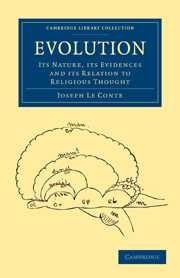Book contents
- Frontmatter
- PREFACE TO THE SECOND EDITION
- PREFACE TO THE FIRST EDITION
- Contents
- PART I WHAT IS EVOLUTION?
- PART II EVIDENCES OF THE TRUTH OF EVOLUTION
- CHAPTER I GENERAL EVIDENCES OF EVOLUTION AS A UNIVERSAL LAW
- CHAPTER II SPECIAL PROOFS OF EVOLUTION
- CHAPTER III THE GRADES OF THE FACTORS OF EVOLUTION AND THE ORDER OF THEIR APPEARANCE
- CHAPTER IV SPECIAL PROOFS FROM THE GENERAL LAWS OF ANIMAL STRUCTURE, OR COMPARISON IN THE TAXONOMIC SERIES
- CHAPTER V PROOFS FROM HOMOLOGIES OF THE VERTEBRATE SKELETON
- CHAPTER VI HOMOLOGIES OF THE ARTICULATE SKELETON
- CHAPTER VII PROOFS FROM EMBRYOLOGY, OR COMPARISON IN THE ONTOGENIC SERIES
- CHAPTER VIII PROOFS FROM GEOGRAPHICAL DISTRIBUTION OF ORGANISMS
- CHAPTER IX PROOFS FROM VARIATION OF ORGANIC FORMS, ARTIFICIAL AND NATURAL
- PART III THE RELATION OF EVOLUTION TO RELIGIOUS THOUGHT
- Index
CHAPTER I - GENERAL EVIDENCES OF EVOLUTION AS A UNIVERSAL LAW
Published online by Cambridge University Press: 29 August 2010
- Frontmatter
- PREFACE TO THE SECOND EDITION
- PREFACE TO THE FIRST EDITION
- Contents
- PART I WHAT IS EVOLUTION?
- PART II EVIDENCES OF THE TRUTH OF EVOLUTION
- CHAPTER I GENERAL EVIDENCES OF EVOLUTION AS A UNIVERSAL LAW
- CHAPTER II SPECIAL PROOFS OF EVOLUTION
- CHAPTER III THE GRADES OF THE FACTORS OF EVOLUTION AND THE ORDER OF THEIR APPEARANCE
- CHAPTER IV SPECIAL PROOFS FROM THE GENERAL LAWS OF ANIMAL STRUCTURE, OR COMPARISON IN THE TAXONOMIC SERIES
- CHAPTER V PROOFS FROM HOMOLOGIES OF THE VERTEBRATE SKELETON
- CHAPTER VI HOMOLOGIES OF THE ARTICULATE SKELETON
- CHAPTER VII PROOFS FROM EMBRYOLOGY, OR COMPARISON IN THE ONTOGENIC SERIES
- CHAPTER VIII PROOFS FROM GEOGRAPHICAL DISTRIBUTION OF ORGANISMS
- CHAPTER IX PROOFS FROM VARIATION OF ORGANIC FORMS, ARTIFICIAL AND NATURAL
- PART III THE RELATION OF EVOLUTION TO RELIGIOUS THOUGHT
- Index
Summary
Let us again remind the reader that evolution means, first of all, continuity. The law of evolution, although it doubtless means much more, means, first of all, a law of continuity, or causal relation throughout Nature. It means that, alike in every department of Nature, each state or condition grew naturally out of the immediately preceding. In a word, it means that, in the course of Nature, nothing appears suddenly and without natural cause, but, on the contrary, everything is the natural and usually the gradual outcome of a previous condition. This is now admitted by every one in regard to nearly everything: evolutionists apply it to the whole course of Nature. I said this is now admitted by every one in regard to nearly everything; but this has not always been so. The world has come to its present position on this subject only by a very gradual process. Let us then trace rapidly the history of the gradual change, for it will prepare us for much that follows.
There was a time (and that not many decades ago) when all things, the origin of which transcends our ordinary experience, were supposed to have originated suddenly and without natural process—to have been made at once, out of hand. There was a time when, for example, mountains were supposed to have been made at once, with all their diversified forms, of beetling cliffs and thundering waterfalls, or gentle slopes and smiling valleys, just as we now find them.
- Type
- Chapter
- Information
- EvolutionIts Nature, its Evidences and its Relation to Religious Thought, pp. 53 - 66Publisher: Cambridge University PressPrint publication year: 2009First published in: 1898

